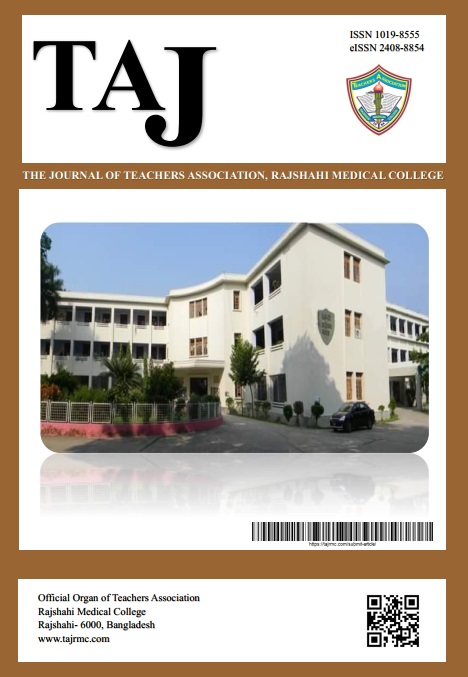| Thyroid Dysfunctions in Patients with Menstrual Disturbances |
| Wahida Khatun, Abu Hena Mostafa Kamal, Khondokar Seheli Nasrin Lina |
| DOI: https://doi.org/10.62469/taj.v037i01.007 |
| Pdf Download |
Background: The menstrual cycle is intricately governed by hormonal changes and organ responses. Imbalances in this finely tuned system can result in various menstrual problems. Thyroid dysfunction, including hypothyroidism, hyperthyroidism, and subclinical hypothyroidism, has been identified as a potential cause of menstrual irregularities. Objective: To assess the frequency of thyroid function disorders in patients presenting with menstrual disturbances and to investigate the association between thyroid function disorders and specific types of menstrual abnormalities. Methods: Conducted as a non-interventional study, research was carried out within the Obstetrics and Gynecology department of Rajshahi Medical College Hospital from January 2009 to December 2010. A total of 166 female patients aged 16-45 years with a history of menstrual disturbances were included, adhering to predetermined inclusion and exclusion criteria. Data were collected using a structured questionnaire encompassing all pertinent variables. Data analysis involved descriptive statistics and the Chi-square (x2) test. Results: Out of the 166 patients examined through a comprehensive process involving history, examination, and relevant laboratory tests (including T3, T4, and TSH), 28 were diagnosed with thyroid disorders. At the same time, 138 were found to have euthyroid status. The frequency distribution of thyroid function among these cases revealed 138 (83.1%) were euthyroid, 18 (10.8%) were hypothyroid, 4 (2.4%) were hyperthyroid, and 6 (3.6%) exhibited subclinical hypothyroidism. Conclusions: Thyroid dysfunction is intricately linked with menstrual irregularities, impacting various aspects of the menstrual cycle. Menorrhagia, oligomenorrhea, hypomenorrhea, amenorrhea, and Polymenorrhoea were among the common menstrual disturbances observed in patients with thyroid disorders. Thus, a comprehensive evaluation of individuals with menstrual disturbances should incorporate thyroid assessment, detailed medical history, and thyroid examination. Moreover, specific thyroid function tests should be administered to these patients

